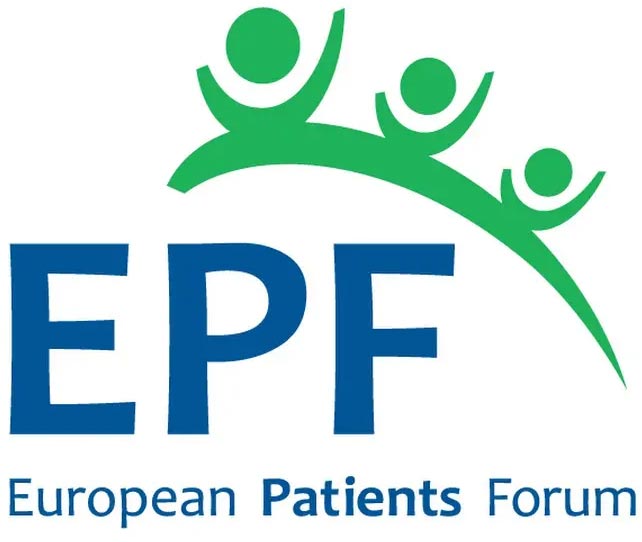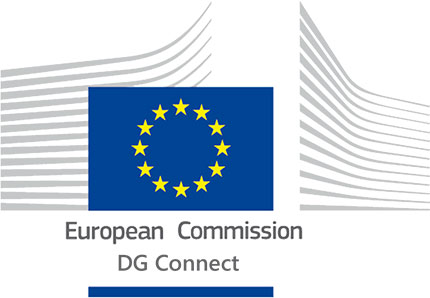Healthcare systems
The year 2024 was a big regulatory push to set up the foundations of EU cooperation on Health Technology Assessment (HTA), which is a law meant to reduce EU duplications and inequalities in defining patient’s access to innovative care in Europe.
With the adoption of the EU HTA Regulation (EU HTAR) 2021/2282 in 2021 and its projection to enter into force early 2025, in 2024 the European Commission rolled out the work to complete the EU HTAR through five additional laws. Together with input from our community, EFA participated in all five EU public consultations, where we strongly conveyed that joint EU HTA should operate in a patient-centred way, allowing for structural and inclusive patient expert and patients organisations input at all stages of the process.
EFA’s involvement has been fundamental in legislating that patients’ organisations can be consulted at any stage of the EU HTA process. We worked closely with the European Patients Forum (EPF) on 10 key recommendations to enhance patient participation in joint clinical assessments. However, despite the warnings from our expert community, the European Union chose to adopt an extremely exclusive conflict of interest framework to determine the individual medical and patient experts that will be allowed to participate in the processes. While the EU HTAR will only be applicable for innovative products for allergy, atopic eczema, asthma and COPD from 2030 onwards, we remain alert to assess, from our side, if the EU HTA will be effectively informed by patients and their organisations.
EFA’s input in the definition of EU HTA rules
Implementing regulation on joint clinical assessments on medicinal products – EFA response to the European Commission consultation on Joint Clinical Assessment for HTA – European Federation of Allergy and Airways Diseases Patients’ Associations (EFA)
Implementing regulation on the procedural rules for assessing and managing conflicts of interest – EFA calls for strong patient involvement in EU Health Technology Assessments – European Federation of Allergy and Airways Diseases Patients’ Associations (EFA)
implementing Regulation on procedural rules for the cooperation with the European Medicines Agency (EMA) – EFA responds to the HTA consultation on the cooperation with the EMA – European Federation of Allergy and Airways Diseases Patients’ Associations (EFA)
Implementing Regulation on joint scientific consultations on medicinal products for human use at Union level – EFA calls for a stronger patient involvement in HTA consultation on medicines – European Federation of Allergy and Airways Diseases Patients’ Associations (EFA)
Implementing Regulation on joint scientific consultations on medicinal devices and in vitro diagnostic medical devices – EFA calls for strong patient involvement in HTA consultation on medical devices – European Federation of Allergy and Airways Diseases Patients’ Associations (EFA)
EFA’s participation in the EU HTA stakeholder network meetings
EFA’s participation in HTA infosessions
EFA expresses concern with a de facto restriction on most, if not all, patient organisations to participate in EU HTA consultation processes. The declaration of interest and its assessment based on the proposal at hand should serve as a basis to manage potential risk of conflict of interest rather than to apply a zero risk of conflict criteria that risks leading to automatic exclusion of patient representatives who are part of a patient organisation. Patient organisations, independently of their funding, are key partners in health and care representing the genuine interests of the patients, and we have a track record to show.
Access to medicines
Supporting the agency in regulating new medicines for EFA patients
In 2024, EFA participated in the four EMA Patients’ and Consumers’ Working Party meetings, organised jointly with the Healthcare Professionals Working Party (HPWP).
In 2024, we collaborated with the European Medicines Agency in their regulatory work to evaluate and authorise the commercialisation of innovative medicines in the EU. In total, the EMA authorised 10 new medicines for the EFA community, enlarging the portfolio of treatment choices for patients, and we were involved at some stage of the process with all of them. We highly welcomed the industry efforts to develop medicines for children and in ways that enable easier patient use. In this trend, EMA authorised an innovative adrenaline nasal spray to treat anaphylaxis which is less invasive and more child-friendly. The EMA also approved a new cream to treat moderate-to-severe chronic hand eczema in adults when topical corticosteroids are insufficient, and a new molecule to treat severe persistent asthma caused by an allergy, that can be used by children from six years old. Innovation also looked at respiratory virus and in 2024 the EMA approved an infusion that may be used for COVID-19 infections, a new vaccine to treat respiratory syncytial virus (RSV), and other five vaccines to prevent severe influenza infections, one of them in the form a nasal spray.
EFA supported the EMA in finding patients and patient experts for a variety of processes such as reviewing package leaflets or being part of a scientific advice procedure for treatments important for our patient community. Over the year, EMA contacted EFA 14 times with various requests for patient input on medicines under evaluation to treat atopic dermatitis, hand eczema, urticaria, food allergy, anaphylaxis, chronic rhinosinusitis, asthma, COPD, interstitial lung disease, influenza, pneumonia, and avian flu. EFA and patient experts from our community participated in three scientific advice procedures, four medicines reviews and two package leaflets reviews. All these requests and work testify to the variety and expertise of our community and the close cooperation EFA has with the agency.
In 2024, EFA contributed to five EMA public consultations. Three of our responses addressed the revision or publication of new guidelines addressing quality and benefits of medicines, namely the therapeutic equivalence for oral and inhaled products for asthma and COPD, and the quality of nasal products, as well as the guidelines for the development of allergen products for immunotherapy and allergy diagnosis in moderate to low-sized study populations.The other two EFA submissions nurtured on the one hand to a potential EMA guidance for patient groups to address shortages and on the other hand, an important call for the agency on being balanced when applying rules on the interpretation of patients’ experts potential conflict of interest with the pharmaceutical sector.
EFA is eligible member organisation to the EMA since 2013, represented by EFA Director of Policy and Communications, Isabel Proaño.
Addressing medicines shortages at European and EU level
Medicine shortages are a major threat for patients’ health and life and a recognised problem at European region level. EFA has therefore joined the EU efforts to reduce shortages through mechanisms and future legislation, especially when our community was affected by two major disruptions in 2024. In June, the EMA got notified about the Europe-wide shortages of Salbumatol and requested EFA to review and enrich their communication about the topic. We liaised with some producers within our sustainable funding corporate partners to understand the reasons behind the disruption and the timelines to solve it. We organised a meeting with EFA Members, discussed this major backdrop and maintained open lines to support each other informing patients in the ground. Unfortunately, Salbutamol was in shortage in 2024 and beyond. In July, our member Food Allergy Italia raised the issue of a significant shortage of an adrenaline autoinjector brand due to foreseen changes in the syringe device and called on the national medicines agency to notify it to the EMA.
EFA also was elected to join the European Commission Critical Medicines Alliance (CMA), an initiative led by the Director General for Health Emergency Preparedness and Response Authority (DG HERA) set to bring together stakeholders to strengthen cooperation and identify the challenges, the priorities for action and possible policy solutions to the issue of shortages of critical medicines in the EU.
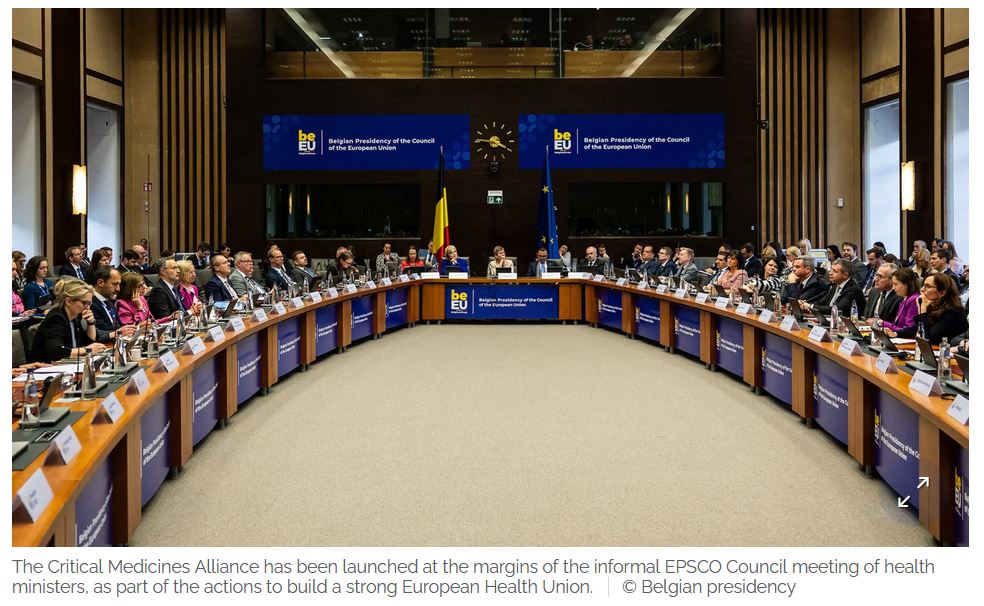
Disease prevention
In 2024, EFA continued informing the European Commission’s Health Emergency Preparedness and Response Authority (HERA) through our membership to the Civil Society Forum (CSF). We brought the allergy and respiratory patients’ concerns to nurture their health threat assessment and celebrated that the EU moved respiratory infections and fevers as the health threats with the highest priority.
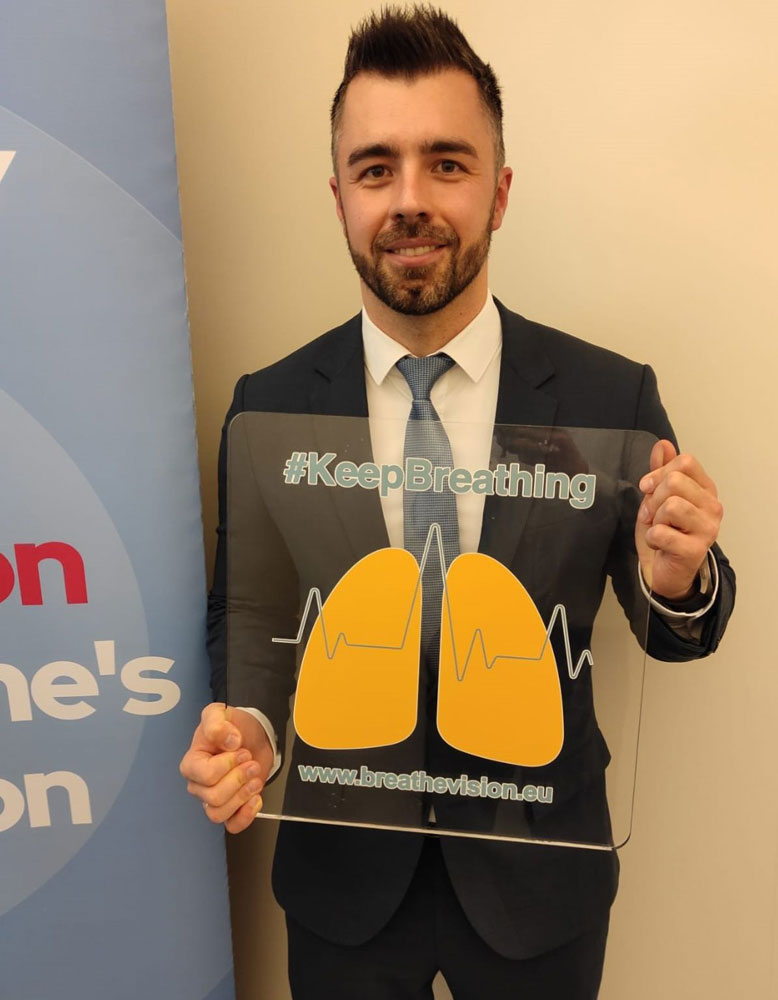
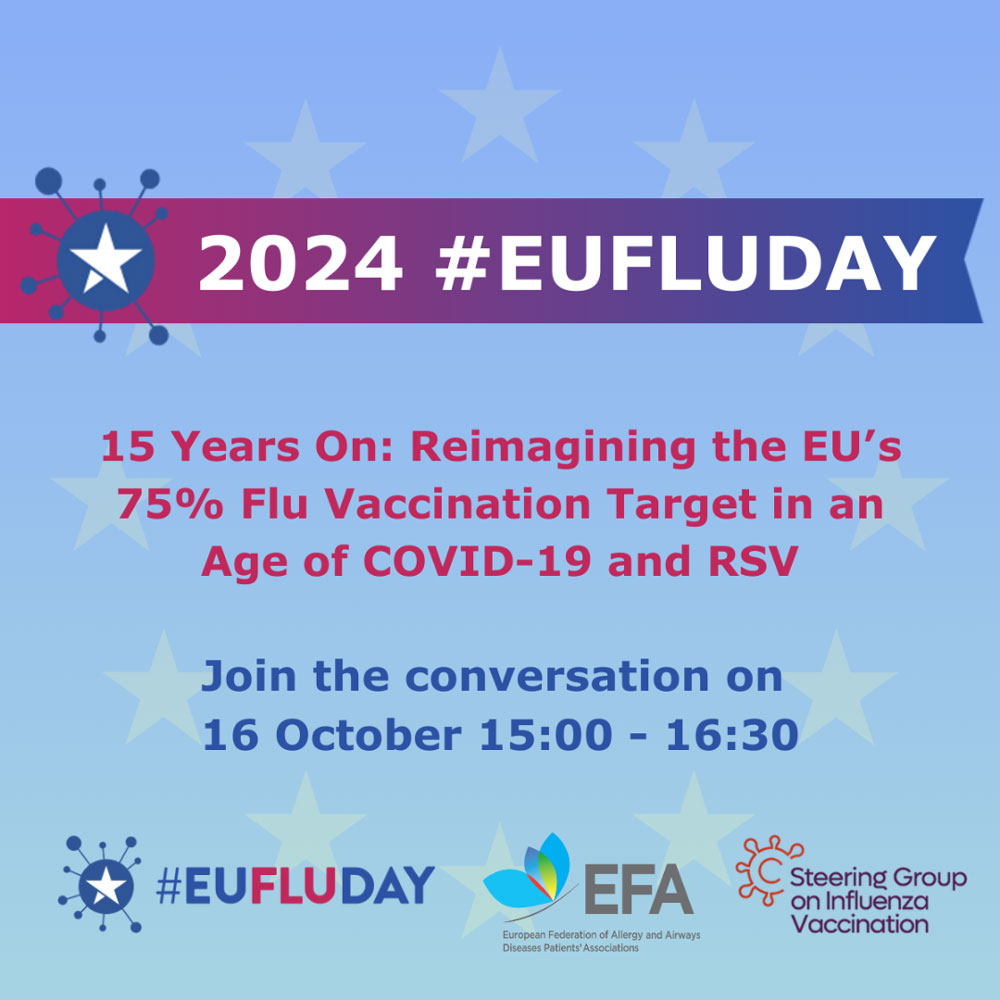
In December, EFA participated in the European Commission survey for the evaluation of the EU Regulation on serious cross-border health threats (2022/2371), which provides for strengthened coordination and collaboration between the Commission, EU agencies and Member States in the prevention, preparedness and response to a health emergency. In our evaluation, EFA welcomed the legislation as it introduces obligations to adopt national plans and assess capacities on cross border health threats. We also recommended the Commission to fill in key current gaps such as strengthening the role of civil society in emergency preparedness and response, reducing shortages in the healthcare workforce, addressing chronic diseases such as allergy, asthma and COPD and including climate change hazards in the health emergency plans[1].
As member of the Steering Group on Influenza Vaccination, EFA participated in the communication campaign and European Parliament campaign leading to the EU Flu Day. EFA emphasised that ensuring easy access to immunisation against respiratory infections, like seasonal influenza, is essential to protect people with chronic respiratory diseases from severe and life-threatening complications[2].
Digital health for patients
Improving the health data infrastructure in Europe is on top of the regional health policy agenda. In 2024, EFA advocated to have meaningful digital health tools for patients, pushing to improve patient access to digital health technologies, with a particular focus on patient safety.
In 2024, EFA was selected to become an observer to the European Commission’s Directorate General for Communications Networks, Content and Technology (DG CNECT) eHealth stakeholder network (eHSG). As part of this expert network, EFA will be able to inform the institutions about the roll out of the first EU regulation on the European Health Data Space (EHDS), which by the start of 2025, was adopted by the Council and Parliament. EFA was able to contribute to the policy debate directly by attending meetings, which revealed the enormous amount of upcoming initiatives in digital health, including Joint Actions developing guidelines for implementation of TEHDAS, but also genomics, cancer imaging and e-records. We also attended a meeting on Artificial Intelligence (AI) organised by our partner the European Patients’ Forum[3].
